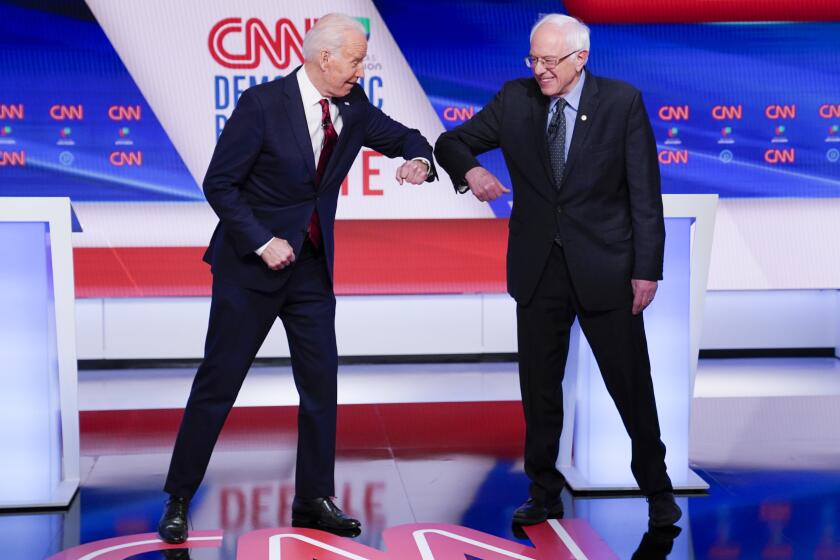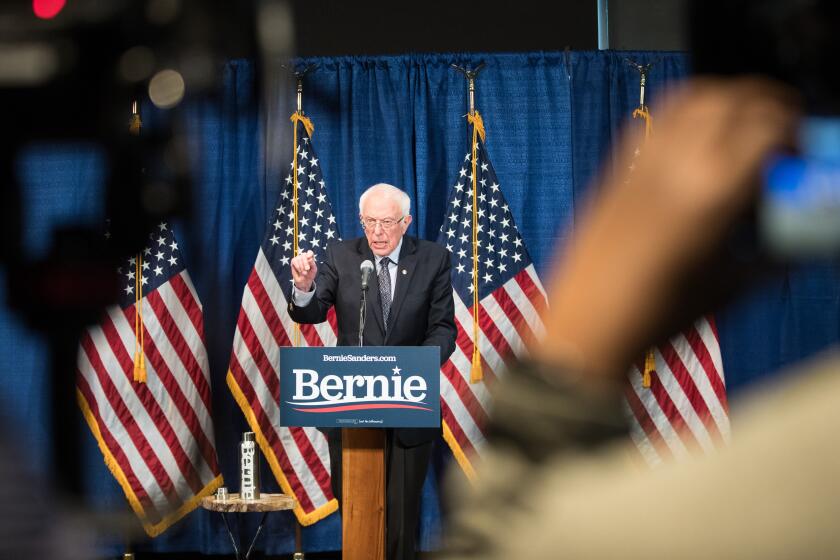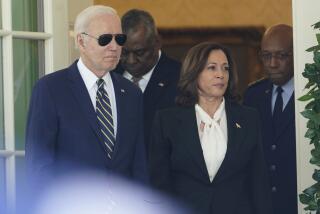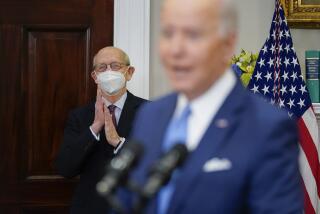In a Democratic debate dominated by coronavirus, Biden vows to put a woman on the ticket

Joe Biden vowed to pick a woman as his running mate and temporarily halt all immigrant deportations during a Democratic presidential debate Sunday where the pronouncements competed with concerns about a coronavirus pandemic that has the nation on edge.
Though the former vice president dominates the race, the debate was a crucial test for him at an uncertain time. The nation’s anxiety over the outbreak hung over the event, which had been moved from Phoenix amid worries about spreading the virus and held instead in a quiet CNN studio in Washington with no live audience and no press room filled with reporters. The candidates avoided shaking hands.
As Vermont Sen. Bernie Sanders challenged Biden’s record, his plans and his fitness for office, Biden labored to project himself as open-minded and statesmanlike.
“I commit that I will, in fact, pick a woman to be vice president,” Biden said. “There are a number of women who are qualified to be president tomorrow. I would pick a woman to be my vice president.”
Sanders did not make the same vow but said that “in all likelihood, I will” select a woman as running mate. “For me, it’s not just nominating a woman, it is making sure we have a progressive woman, and there are progressive women out there,” he said.
Throughout the debate, Biden signaled that he has shifted his vision to include a more expansive and compassionate view of government in his effort to persuade Sanders’ supporters that there is a place for them in the Biden campaign.
“The first hundred days of my administration, no one — no one — will be deported at all,” Biden said, laying out a new plank of his immigration plan certain to please progressives.
He embraced the bankruptcy proposal of former rival Sen. Elizabeth Warren of Massachusetts and called for making public college free for students from families earning less than $125,000 a year. Biden even gave Sanders credit for inspiring him to promote free college, calling it “a good idea, and I support it.”
Biden added: “I’m not saying everything Bernie said has been wrong. He happened to be right on that one.”
Coronavirus casts a long shadow, plenty of disagreement but no knockout blows.
Biden also promised to ban fracking, which he had not previously done. The pledge on the debate stage was cheered by progressive environmental activists, who have accused the former vice president of being too cozy with the fossil fuel industry.
Yet Sanders was unimpressed by the shift in tone, challenging Biden on his record throughout the night, particularly when it came to his support of the bailouts after the last financial crisis. The senator said Biden’s involvement in those Obama-era moves raises doubts about whether he is best equipped to handle an economy reeling from the coronavirus outbreak.
Sanders had signaled last week that his goal on the debate stage was not so much to cripple Biden as to push the center-left front-runner to embrace more progressive policies.
But the two rivals still clashed repeatedly in this first — and possibly final — head-to-head matchup, particularly as each worked through how they would confront the pandemic and its aftermath.
Biden tried to straddle the line between not antagonizing the Sanders movement and positioning himself as the experienced, steady hand who has helped navigate the world through crisis before and is best equipped to do so now.
“We need to stabilize the economy, but we can’t repeat what we did in 2008,” Sanders said. He described the 2008 bailouts of the financial and insurance industries as having benefited “a handful of people that have incredible wealth that have prospered” off illegal behavior on Wall Street.
Biden took exception. “Had those banks all gone under, all those people Bernie says he cared about would be in deep trouble,” Biden said. “This was about saving an economy, and it did save an economy.”
Both candidates, though, argued there needs to be widespread financial relief for middle-class Americans threatened with job loss and other financial hardship as the economy is shaken by the outbreak.
“We are going to have to have a major, major, major, major bailout package that, we do not reward corporations, we reward individuals,” Biden said. He argued that the relief needs “to let people know their mortgage is going to be paid, their rents are going to be paid.”
He also said he would mobilize the military to confront the pandemic, arguing that troops could build temporary hospitals.
But Biden jabbed at Sanders’ sweeping proposals for a massive — and permanent — social safety net as impractical, saying that “people are looking for results, not a revolution.”
Biden and Sanders face off Sunday at the March Democratic debate, where they’ll have more time to talk about policy. Here’s where they stand on five issues.
And the two men sparred over the extent to which the kind of nationalized health insurance system Sanders champions could help the nation manage a crisis like the coronavirus.
“You have a single-payer system in Italy — it doesn’t work there,” Biden said. “It has nothing to do with ‘Medicare for all.’”
Sanders countered that the crisis is being compounded by the nation’s existing, fractured healthcare system.
“The bottom line here is, in terms of Medicare for all, despite what the vice president is saying, what the experts tell us is one of the reasons we are unprepared and have been unprepared is we don’t have a system,” Sanders said. “We’ve got thousands of private insurance plans. That is not a system that is prepared to provide healthcare for all people.”
Biden accused Sanders of framing the crisis falsely, saying that all of the care required by those affected by the coronavirus will be paid by the federal government, pointing to a bill passed by the House of Representatives on Saturday that provides free testing, paid sick leave and paid family leave.
“We’re at war with a virus,” Biden said. “This has nothing to do with co-pays.”
Sanders, reflecting criticism of the bill, which exempts millions of American workers, objected, “That’s not true.”
“The trick is, do we have the guts to take on the healthcare industry, some of which is funding the vice president’s campaign?” Sanders later said.
Bernie Sanders is losing the electability argument in the Democratic primary, but he asserts he is winning the battle of ideas. On healthcare, college tuition and championing working-class issues, he has shaped the policy contours of this Democratic race.
The virus creates a dangerous medical risk personally for the candidates, both of whom are in their late 70s. They talked of how it has drastically changed their campaigns.
“I love doing rallies, and we bring many thousands of people out to our rallies,” said Sanders, who has an underlying heart condition that makes the virus particularly threatening for him. “We’re not doing that right now.”
Sanders added that his staff is working from home, and he is not shaking hands with anyone. He and Biden had greeted each other with an elbow bump.
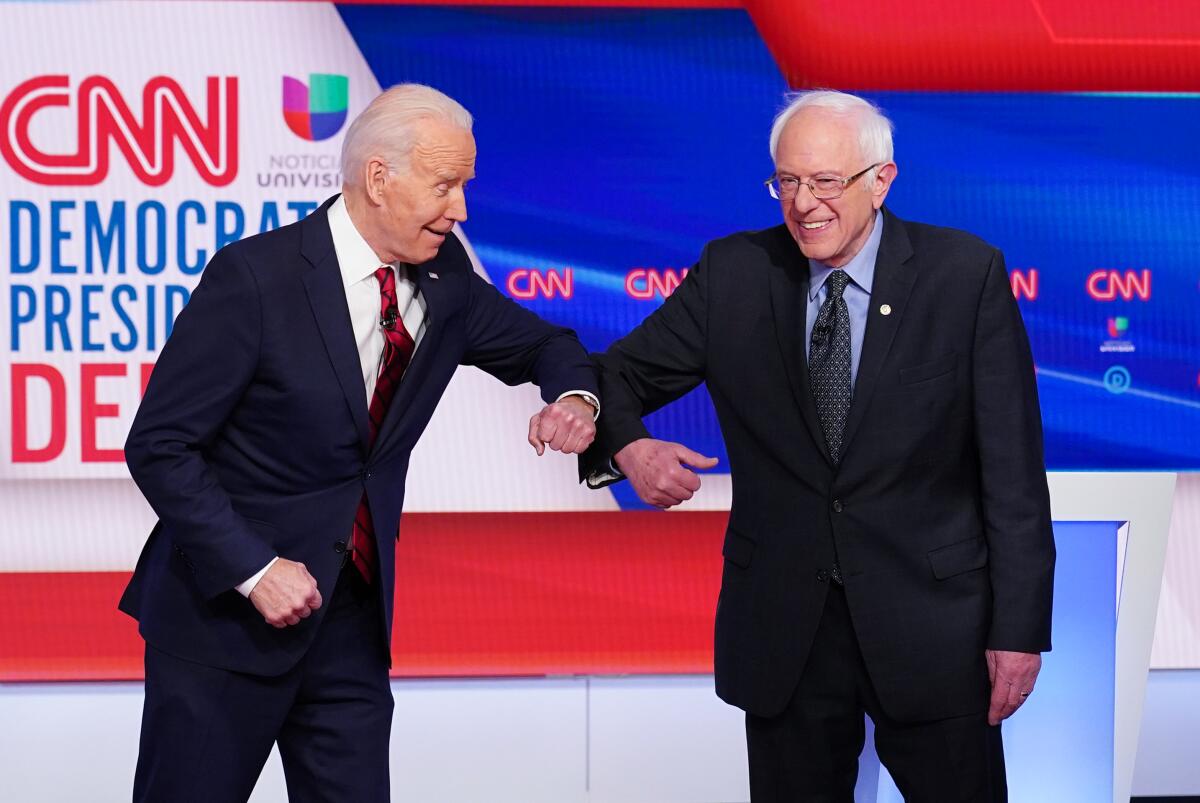
“Joe and I did not shake hands,” Sanders noted. “I am very careful about the people I am interacting with.”
Biden used the moment to poke at Sanders’ health issues, which have received little scrutiny in the campaign.
“Fortunately, I don’t have any of the underlying conditions you’re talking about that I have to worry about,” he said. “I’ve taken all the precautions we’ve told everybody else to take.”
The rivals met in Washington as voters in Arizona, Florida, Illinois and Ohio prepare to go to the polls Tuesday.
All are states that Sanders lost in 2016, and the outlook for him is dim again, leaving the walls quickly closing in on his candidacy. Sanders’ strategy is built around energizing masses of new, mostly younger voters. But those voters have not been turning out in the numbers the Vermonter needs to win the nomination.
Biden is comfortably ahead in polls in every one of the states voting Tuesday.
But he still faces his own challenges mobilizing young voters, and he also struggles with Latino voters. Both Florida and Arizona have large Latino populations. Biden rebuffed a moderator’s suggestion that he was failing to attract Latino voters by arguing that he was increasing turnout across the board in the states he has won.
“The reason is because they know I am a Democrat, with a capital D, who in fact believes that our base is the base of the Democratic Party, which are hardworking men and women who are in fact our high-school-educated African Americans and minorities including Hispanics, but all minorities, suburban women, people who in fact have a sense of our place in the world,” Biden said. “That’s why I’m winning. Not just winning, but overwhelmingly winning.”
Sanders countered that Biden would be unable to increase voter turnout among young people and Latinos enough to defeat President Trump in November.
“I have my doubts about how you win a general election against Trump, who will be a very, very tough opponent, unless you have energy, excitement, the largest voter turnout in history,” Sanders said. “I have my doubts that Vice President Biden’s campaign can generate that energy and excitement and that voter turnout. I will do that.”
Yet as voters prepare to cast ballots in key states Tuesday, polls suggest that movement is not as big as Sanders needs it to be.
Halper reported from Washington and Mehta and Pearce from Los Angeles.
More to Read
Get the L.A. Times Politics newsletter
Deeply reported insights into legislation, politics and policy from Sacramento, Washington and beyond. In your inbox three times per week.
You may occasionally receive promotional content from the Los Angeles Times.
